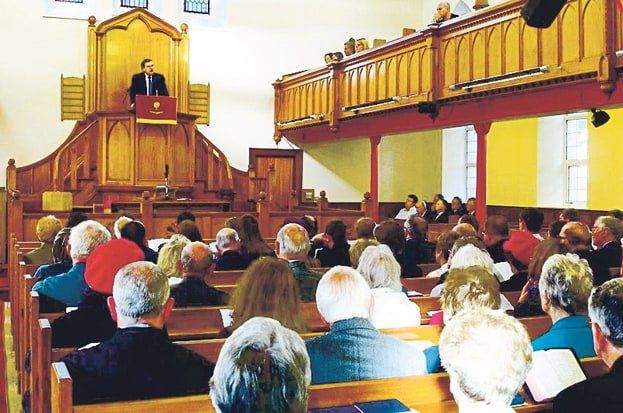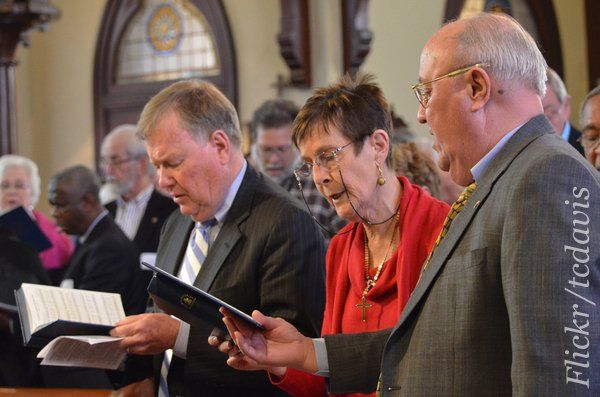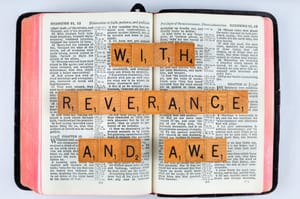
Everything that is said in a local church must be in a language understood by all; this the Word of God teaches clearly (1 Corinthians 14:1-25). But how narrowly should we interpret the word ‘language’? What if everyone in the church speaks the same national language, but the vast majority also speak a dialect of that language? What if that dialect is precious to those who understand it? What if they find it a better means for talking about the things of God? What should a local church do in these circumstances – should it use the language, or should it use the dialect?
Language and dialect
We are not talking here about regional accents. People from Cornwall and Yorkshire sound very different to each other, but speak the same basic language. Nor are we simply talking about differences of vocabulary, though these are an important part of any dialect. What distinguishes a dialect from the national language, and from other dialects, are significant grammatical differences.
I was once in a large Christian meeting in the German-speaking part of Switzerland. Most people present were from the canton of Berne. As they waited for the meeting to start, I could hear them talking to each other in Bernese. But the meeting began by the chairman asking (in High German) how many people did not speak Bernese. Just five or six people raised their hands. Once it was clear that the only language common to all was High German, the meeting unanimously agreed to proceed in that tongue. For the next couple of hours those who loved their dialect put it aside. I believe that was the right decision. It was biblically justified and therefore pleasing to God.
Britain today
In our country our national language of years ago has now become a dialect. We may not wish this to be so, but facts are facts. Many of us love this dialect, feel free to use it in certain contexts, and certainly consider it to be superior to contemporary English when it comes to expressing God’s truth. It would be wonderful if it was still the language of the men and women around us. But it isn’t.
There are vast differences in grammar and vocabulary between the language of the Authorized Version and that of our peers.

The language of the Puritans and eighteenth-century revivalists, the language of countless numbers of our hymns and metrical psalms, is simply not that of contemporary British people. They would certainly be richer if they learned it. It would give them easy access into the greatest of all Bible versions and into our vast heritage of Christian literature. But if only a handful of people did not understand it, or even just one, it would be wrong to use it in church – as long as there was another language common to all. Not to accept this is to fly in the face of Holy Scripture.
Of course there are many congregations made up of people who all understand this exalted dialect. They will see no need to change the language in which they sing, pray, read and preach. But what will they do when non-dialect speakers start coming in? Will they make the mastering of the dialect a condition of full participation in worship? Will they tell the newcomers that there can be no progress in the Christian life without learning to speak in another tongue?
Are we fooling ourselves?
Is it possible that churches currently operating in dialect are kidding themselves as to how well that dialect is really understood? For example, when do you say ‘thou dost’ and when ‘thou doest’? What is the precise difference in meaning between ‘thou diddest’ and ‘thou hast done’? Is it ever correct to say ‘thou didst do’? When should you use ‘ye’, and when ‘you’? Which is right, ‘my eyes’ or ‘mine eyes’?
Do today’s dialect speakers really know the answers to these questions? And what is the Authorized Version saying when it declares: ‘And they made ready the present against Joseph came at noon’? (Genesis 43 :25). What does it mean to ‘lay apart all filthiness and superfluity of naughtiness’? (James 1:21). What did Jesus want to know when he asked, ‘Children, have ye any meat?’ (John 21:5). Who were ‘the publicans ‘that he welcomed in Luke 15:1, and who or what are ‘the thick bosses’ of Job 15:26?And when did any dialect speaker last talk of ‘the champaign’ (Deuteronomy 11:30), ‘collops’ (Job 15:27)or ‘a very grievous murrain’ (Exodus 9:3) – in church, or out of it?
Quite categorically, the use of dialect is not acceptable unless everyone present understands it. And is it not double-think to say that this is true of prayer, preaching and Bible versions, but that an exception may be made in congregational singing?

Most of our best hymns are written in a former English which is poetic, subtle and beautiful – but which is no longer the language of the people. These hymns should therefore be translated. This is obviously not necessary for those who are competent in both former and modern English, but how many of our people truly are? Undoubtedly a great deal will be lost in the translation, as is always the case. But is it not better to sing an inferior hymn which is fully understood than a superior one whose meaning is not entirely plain?
A practical exercise
If you consider that the time has not yet come for your church to put aside its use of dialect, I invite you to do a little exercise. Select at random ten people in your congregation. Now ask them to give the exact meaning of the following lines, all of which are taken from Christmas carols:
Sages, leave your contemplations; Brighter visions beam afar. Trace we the Babe who hath retrieved our loss From his poor manger to his bitter cross. All meanly wrapped in swaddling bands, And in a manger laid. He comes, from thickest films of vice To clear the mental ray, And on the eyeballs of the blind To pour celestial day.
This done, ask them to explain (without hesitating) the following words, all of which are found in most hymn-books: proffer, travail, afford, succour, fain resign, vernal, balmy, magnify, alloy, sunder, hail! hark!
How did they get on in these two exercises? Could they do them on the spot and without the slightest delay? Are they as fluent in dialect as they are in their mother tongue?
Where all this leads
When it comes to the language we use in our churches, most of us have a clear choice to make. We cannot be neutral. There are two possible roads ahead and we must choose one of them. So which one will it be? Will we hang on to our outdated language, impose it on others, and thus throw biblical obedience to the wind? Or will we submit to what God’s Word teaches on this point, and so take one step further towards being truly reformed?
An alternative view to this article can be read in The language of faith… and a personal response






















